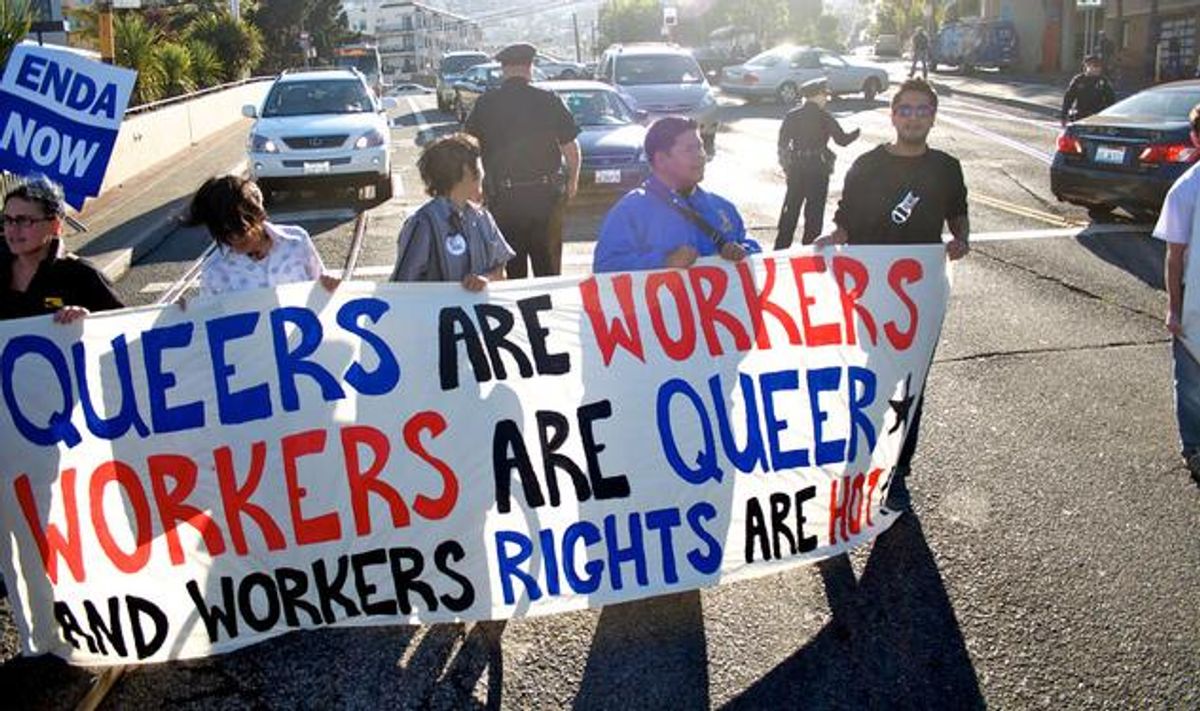News & Opinion
Return of the ENDA: A Brief Primer

A familiar proposal to ban LGBT discrimination in the workplace is back.
April 26 2013 10:13 AM EST
July 19 2018 7:04 AM EST
By continuing to use our site, you agree to our Private Policy and Terms of Use.

A familiar proposal to ban LGBT discrimination in the workplace is back.
Yesterday, in both the House and the Senate, lawmakers reintroduced Employment Non-Discrimination Acts, proposals that would ban the firing or discrimination against all employees, regardless of actual or perceived sexual orientation and gender identity or expression. As a familiar and sometimes bitter debate begins again, here we offer a brief primer for anyone who may not have been paying attention.
What's the problem? The question should be "Where's the problem," and the answer is "more than half-of-the-nation." Yes, it's completely legal to fire or not hire someone for being gay in 29 states. If you're transgender, the number spikes to 34. To put this into some perspective, there are an estimated 155 million people in the legitimate American work force and only 121 million of those people are married. In other words, more people need to participate in the institution of capitalism than want to get married, and countless Americans are potentially excluded from both.
Haven't we heard of ENDA before? Yes, ENDA has been introduced in every congressional cycle since 1994 except for one, the 109 Congress, 2005-2007. It actually almost passed the Senate in 1996, but lost by one vote one day before lawmakers passed the Defense of Marriage Act. ENDA since then has gained slow support, though the ride has been bumpy.
The 2007 introduction proved to be particularly thorny and provoked massive LGBT infighting over whether transgender people should be included in the bill's language or left behind, to be picked up at a later date. That sentiment was largely abandoned in 2009 and 2011, years former Rep. Barney Frank led House sponsors in ultimately fruitless fights that never reached a vote. It faced similar fates in the Senate, where it last reached vote in that ill-fated 1996 session.
The previous House vote, in that fractious 2007 debate, saw passage by 235-to-184. It then died in the Senate, a common ending for poor ENDA.
So, who are the lawmakers involved now? Long-time pro-ENDA crusader Sen. Jeff Merkley, a Democrat from Oregon who introduced the previous two Senate versions, and Sen. Mark Kirk, a Republican from Illinois, are leading the fight in that smaller legislative body, and have at least three allies standing by their side: Democrats Tom Harkin and Tammy Baldwin of Iowa and Wisconsin and Susan Collins, Republican from Maine. In the House, Colorado Democrat Jared Polis and Florida Republican Ileana Ros-Lehtinen took the lead of a group of what will likely be a more robust crowd. Though there's no official tally yet, over 100 co-sponsors are reportedly on board.
Do Americans like it? Most definitely. About 73% of the nation supports an ENDA-like law, according to the Center for American Progress, and that includes 66% of Republicans. So, this really should be a no-brainer.
Any problems with these proposals? According to the ACLU, Lambda Legal and others, yes. They say expanded religious exemptions create too wide a loophole. "While we applaud the progress that has been made, we stand united in expressing very grave concerns with the religious exemption in ENDA. It could provide religiously affiliated organizations - far beyond houses of worship - with a blank check to engage in employment discrimination against LGBT people," they said in a statement. They pointed out that many hospitals are associated with religious institutions that could still cry, "Gay."
What about the President? Where's he on all this? Oh, he supports employment non-discrimination wholeheartedly. "President Obama also continues to support the Employment Non-Discrimination Act and believes that our anti-discrimination employment laws should be expanded to include sexual orientation and gender identity." That's lifted straight from the White House website. And Press Secretary Jay Carney says, "The administration will continue to work to build support for this important legislation because we believe that this is the right way, the right approach to take, because it is inclusive and that's why we supported it then, that's why we're glad to see it being reintroduced."
So why doesn't he just sign an executive order? Can you do that? Yes, he can sign an order prohibiting federal contractors from discriminating from LGBT employees, and 110 House lawmakers have asked him to do just that, but he hasn't or won't and people are pretty upset about that -- and confused.
Will ENDA pass? Who knows?! Maybe. Considering the rate at which lawmakers are coming around to equality, and coupled with the fact that 73% of Americans support such legislation, it's in the realm of possibility. We're a long way off from a vote. For now activists, lobbyists and sponsors will spend their time trying to steer the bill through committee, shore up support and clear a path to a possible vote. Just because legislation's been introduced doesn't mean it's going anywhere.
One person to watch, though, is Ohio Sen. Rob Portman. He came out for marriage equality after his son came out of the closet, so this is a big test for him and one that many voters and observers will use as a litmus test for his personal progression and his party's, too.
(Image via MattyMatt's Flickr.)